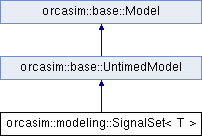The SignalSet class models a generic set of busses of type T. More...
#include <SignalSet.hpp>

Public Member Functions | |
| SignalSet (std::string name, uint32_t nsig) | |
| Constructor. More... | |
| ~SignalSet () | |
| Destructor. More... | |
| Signal< T > * | GetSignal (uint32_t index) |
| Get the a signal from the set. More... | |
| void | MapTo (MemoryType *mptr, MemoryAddr addr) |
| Maps the signal set to a given memory address. More... | |
a name that identifies the model, advisably not empty. | |
Default ctor. | |
| std::string | GetName () |
| Getter method for the <_name> field. More... | |
| void | SetName (std::string s) |
| Setter method for the <_name> field. More... | |
Private Attributes | |
| uint32_t | _num_signals |
| number of signals in the set. More... | |
| MemoryAddr | _mem_addr |
| memory position of the first signal. More... | |
| MemoryType * | _mem_ptr |
| Signal< T > ** | _signals |
| a pointer to the first signal. More... | |
| std::string | _t_name |
| an optional name to identify this model during runtime More... | |
Detailed Description
template<typename T>
class orcasim::modeling::SignalSet< T >
The SignalSet class models a generic set of busses of type T.
Definition at line 47 of file SignalSet.hpp.
Constructor & Destructor Documentation
§ SignalSet()
| SignalSet::SignalSet | ( | std::string | name, |
| uint32_t | nsig | ||
| ) |
Constructor.
Creates a new SignalSet.
- Parameters
-
name An arbitrary name for the instance. nsig Number of signals to be created
Definition at line 46 of file SignalSet.cpp.
§ ~SignalSet()
| SignalSet::~SignalSet | ( | ) |
Destructor.
- Note
- DO NOT free _t_ptr by any means as this pointer must be freed by the class which allocated the space.
Definition at line 58 of file SignalSet.cpp.
Member Function Documentation
§ GetName()
|
inherited |
§ GetSignal()
| Signal< T > * SignalSet::GetSignal | ( | uint32_t | index | ) |
Get the a signal from the set.
- Parameters
-
index The identifier of the signal to be returned.
- Returns
- A pointer to the requested signal.
Definition at line 83 of file SignalSet.cpp.
§ MapTo()
| void SignalSet::MapTo | ( | MemoryType * | mptr, |
| MemoryAddr | addr | ||
| ) |
Maps the signal set to a given memory address.
Signals' addresses are generated by incrementing the address of the first signal.
- Parameters
-
mptr Pointer to the memory location to be mapped addr Address to the set to the first signals
Definition at line 64 of file SignalSet.cpp.
§ SetName()
|
inherited |
Member Data Documentation
§ _mem_addr
|
private |
memory position of the first signal.
Other signals' positions are generated by incrementing this index by sizeof(T)
Definition at line 54 of file SignalSet.hpp.
§ _mem_ptr
|
private |
Definition at line 55 of file SignalSet.hpp.
§ _num_signals
|
private |
number of signals in the set.
Cannot be changed runtime.
Definition at line 50 of file SignalSet.hpp.
§ _signals
|
private |
a pointer to the first signal.
An array will be instantiated to store signals in that pointer.
Definition at line 59 of file SignalSet.hpp.
§ _t_name
|
private |
an optional name to identify this model during runtime
Definition at line 62 of file SignalSet.hpp.
The documentation for this class was generated from the following files:
- orcasim-modeling/include/SignalSet.hpp
- orcasim-modeling/src/SignalSet.cpp
 1.8.12
1.8.12